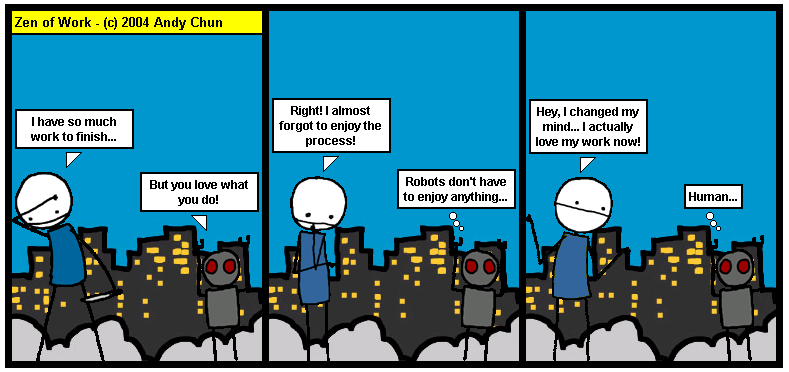
One time while I was studying with Katagiri Roshi I went to dokusan and told him about a zazen breakthrough experience I’d just had. “Pretty good, pretty good,” he said, emphasizing the qualifier the second time through – “pretty good.”
“Anyway,” he continued, “how’s your work going?”
No need for explanation, eh?
Roshi emphasized three important practices – zazen, dharma study and work. Here’s the second in a mini-series on work. Today’s piece is written by another deelply reflective person who has been a Catholic priest and Zen student. Here’s what he says about himself:
I’ve been working at [present employer] for 17 years in a variety of capacities. Most of them as a leader or manager. I started working here after a stint as a priest and learned that my skills in pastoral work easily translated to a corporation. I was always interested in finding ways to integrate compassion as part of my leadership style. When I took up the practice under your teaching I understood that intimacy is not restricted to zendo but is the true state of things.
This led to me to question how intimacy functions in a large corporation. Coaching in a business or corporate environment seemed to be a natural fit. I was hired as a business coach and completed coaching training with CoachU and am now credentialed as a graduate coach.
And how he’s applying the practice:
For the last year I have been working as a business coach. Working with people on a one-to-one basis has opened my eyes to people’s deep discontent with their circumstances. I read an article by Norman Fisher about the need to present the dharma in a very non-traditional or secular way. What he calls his plan ‘B’. This has turned into retreats with business people and lawyers he calls “Company Time.”
I have been giving that a lot of thought and in my coaching sessions I have been introducing people to the practice of simply doing what they are doing for the sake of doing it. I tell them as soon as they notice they are engaging in commentary about what they are doing to appreciate it, and if it’s helpful label it, and then return to what they are doing just as it is.
I think this is a form of work shikantaza. To practice being at home where you are and gently reminding yourself you can be someplace else later. My hope is people can experience that open spacious state of consciousness that lets the senses function freely as they are without getting entangled. I believe that as people cultivate this ’empty field’ at work the right response to conditions, co-workers and customer’s will naturally arise.
I offer this practice to people when they present dissatisfaction with their situation at work. It is how I practice at work and I find it especially helpful in coaching sessions. It allows me to have a presence to people that is open. Instead of thinking about what I am going to say to someone in a coaching conversation the right question seems to arise when I am letting myself hear, see and attend to the coachee without commentary.
How do you practice in your work?











